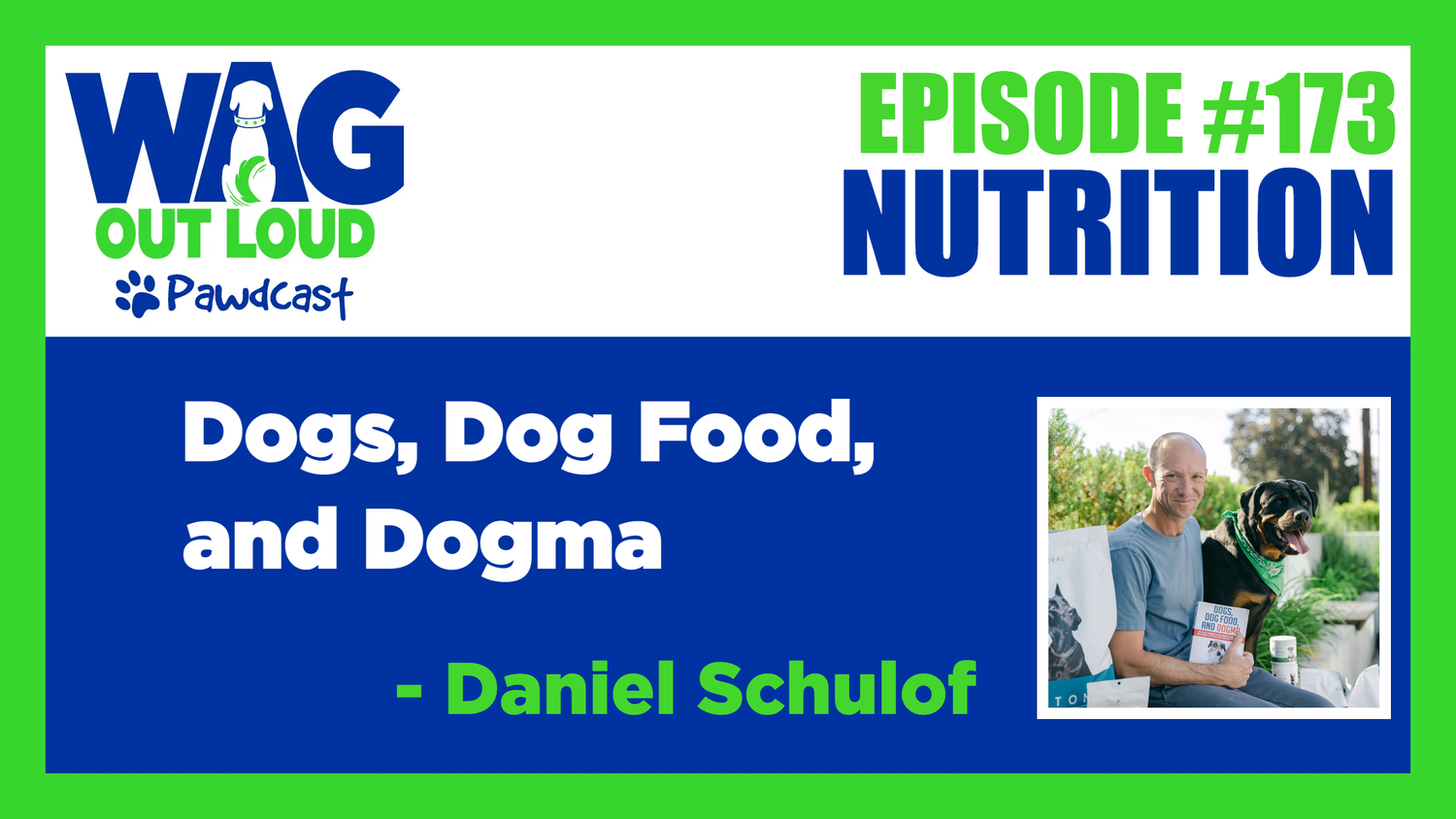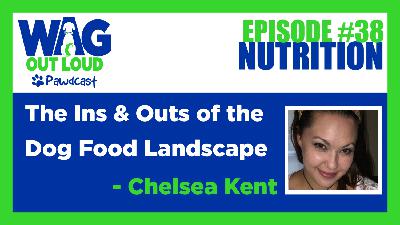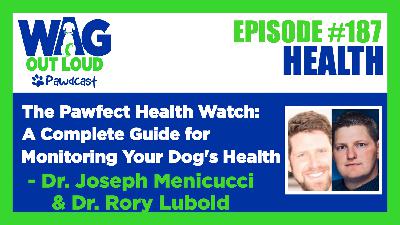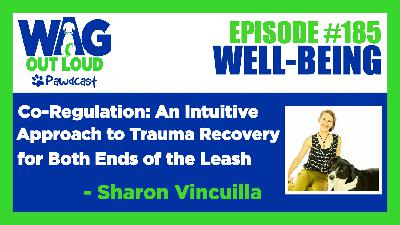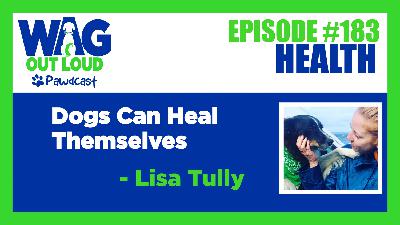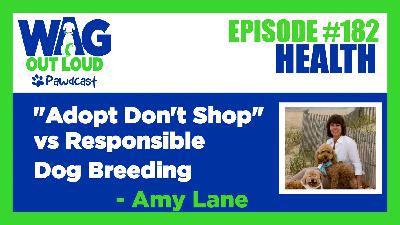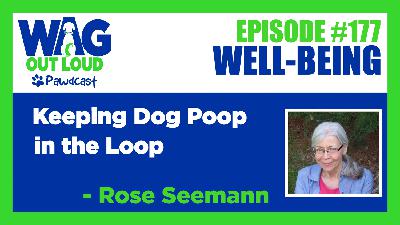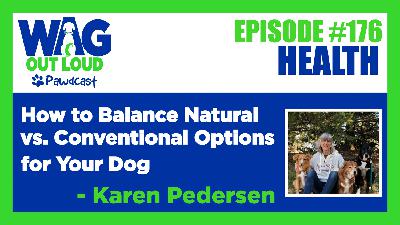Dogs, Dog Food, and Dogma
Update: 2023-04-05
Description
Hey there! This is Krista with Episode #173 on the Wag Out Loud pawdcast and I think that you all know that your dog's urine contains markers, and that informs other dogs of their presence, their social standing and their sexual availability. But maybe you didn't know that male dogs lift their legs as high as they can, so they can distribute their message better, and allow their scent to travel further. And a study done a few years ago found that smaller dogs try to lift their legs even higher, so that they seem bigger to other dogs who may be around.
Welcome to the Wag Out Loud pawdcast, where we are obsessed with bringing you helpful tips on canine health care, nutrition, and overall wellbeing. If you'd like to support the show, check out the amazing online events, products and resources that I personally recommend on the Wag Out Loud website. I'm your host, Krista and I'm super excited to be bringing you yet another tail wagging episode.
Daniel Schulof is an entrepreneur, activist, and science writer with a focus on exposing the conflicts of interest, bad faith, and shoddy science responsible for the chronic disease epidemics killing millions of pets every year. His 2016 book "Dogs, Dog Food, and Dogma" has been called "the most rigorous and probing canine nutrition book ever written" and his lectures and articles have been seen by hundreds of thousands of pet owners. He is the founder of KetoNatural Pet Foods and the Petfood Consumer Rights Council.
Welcome dog lovers to yet another informative Wag Out Loud pawdcast episode. And today I am thrilled to have Daniel Schulof here. And he's going to talk about Dogs, Dog Food and Dogma. And Daniel, first of all, I want to thank you for being with us. You know, it's been a while since we've had you on the schedule.
Yeah, look, the pleasure is home mine. I, you know, I've been fortunate enough to do more than a few podcasts interviews in my life. And I will tell you that you have the fullest calendar of any podcast host with whom I have ever dealt. And it's a credit to the work that you do. You have you have a full plate.
Yes, I do. Well, thank you, Daniel, I appreciate that. Why don't we get started by having you introduce yourself? And I'd love for you to share why are you so passionate about disrupting the canine nutrition space? Because you actually call out those who are totally misinformed.
Yeah, I mean, so by way of introduction, you're right. I'm, I wear a bunch of different hats. But they're all kind of in service of the same idea. And that idea is that the pet owning public has been misinformed in important ways about what the scientific record says about a variety of issues of serious importance pertaining to nutrition in dogs and cats. And that as a result of that there is harm accruing to the public, both to the pets. And of course, to the owners that love them and that are emotionally harmed when their animals get sick in unnecessary ways. Like I said, I wear a few different hats. Because I've got a pretty diverse background. And at the risk of patting myself on the back too much. I've got some diverse skills. I practiced law for a while I'm a lawyer. I've also started numerous entrepreneurial ventures, both for profit and nonprofit. And I've written a book and it's a big fat science book about veterinary nutrition stuff. And so as a result of all of that I've kind of got a unique knowledge base. And I like to think that I've got the unique skill set to make a difference on that issue that matters a lot to me. And so you know, I've founded a couple of companies, the most notable one is called Keto Natural Pet Foods. We Make Low Carb dog food. But yeah, I can tell you more about nonprofit stuff I could tell you about book stuff I can tell you about why all this matters so much to me, wherever you want me to take it.
Great. Well, that's why you're here with us today. And yes, you wrote the book. It's the same title as this episode, Dogs, Dog Food and Dogma. And it has been referred to as the most rigorous and probing canine nutrition book ever written. That's pretty remarkable.
I like to I'm proud of it. It took me four years is a big project for me. I began it. I mean, it really grew up from… the seeds of it was just a personal note taking exercise, honestly. And then fast forward like four years and I had like, changed careers, produced this 400 page book flown all around the country and you know, put this whole big thing together. But really it all began I was working as a lawyer, and I got my I grew up with dogs, but I got my first dog it was like My dog and I was a single guy living, you know, kind of yuppie big city, lonely type lifestyle, got this dog, he changed my life in a very positive way I got really into him. And through, you know, almost through kind of coincidental or just happenstance, I grew really interested in the subject of obesity in pets. And it sounds super weird and random. But I'm a recreational athlete, I do a lot of like endurance sports stuff, I run long and that kind of thing. And so I was doing, I'd always been interested in the science surrounding that how to get better at that kind of stuff. And it's sort of tied to the doggy world in those, you know, there's like a doggy analogue for that. And my dog was a Rottweiler, big, male, Rottweiler, and like quintessentially Rottweilery. He was intense, big, serious dog needed daily exercise is sort of the take home point here. And so, you know, I like exercise played a role in my personal life, I was trying to understand how to exercise him better, I'm starting to read the relevant studies on that topic. And then I get started learning about the problem of obesity, both with regards to my personal care for my dog, but then the bigger societal problem of it, how just how, the how significant the scale, the problem was, and what began as just me trying to understand what the study said about how to like exercise my dog best, became this big adventure, to try to explain why so many dogs in the country are overweight or obese, even though it's absolutely horrible for them. And even though pet owners have never before in the history of the world, cared more devoted more resources to their their dogs and cats, do you think, given everything we know about how bad obesity is in people and how much everybody knows it's bad for their animals, you’d think this would be the easiest thing in the world. And it's turning out to be the hardest thing in the world, it's more than half the dogs in the country are overweight or obese. So you and I have never met. And I've never had the privilege of meeting any of your dogs. And I'm not casting any aspersions. But as a as a purely numerical matter, it's more likely than not that your dog is over one of your dogs is overweight or obese, more than half that I do pick a dog at random, more likely it's going to be and it's worse for those animals than a lifetime of smoking is for a person. The studies had been done where they follow these dogs out throughout their entire lives. And they look at how long the fat ones live and how long the not so fat ones live. And it turns out that on a percentage basis, if your dog is just moderately overweight, so not like colossally clinically obese, huge animal, but moderately overweight, going to shorten its lifespan, on average by about as much as a human being that smokes cigarettes from the time they're 18 years old until the day they die. horrible problem. doesn't make sense to me. And I spent four years trying to understand the answer, basically. And that's what that's what my book was published in 2016. I've been gratified that it's gotten mostly positive feedback. And it does provide my attempt to explain why that kind of inexplicable situation has arisen.
Well, Daniel, you mentioned that you started looking into obesity. And if we look at obesity in ourselves, we can say that poor nutrition and the lack of exercise definitely are the two contributors to that. And in your book, you're talking about scientific misinformation when it comes to animal nutrition, you know, or nutrition for our pets. So what do you think is the root of the problem when it comes down to it?
So you're 100%, right, that you can impact fatness using a variety of levers, but kind of the two that moves the needle the most are diet and exercise, right? The main thesis of my book is that number one, the most powerful lever, and essentially the only one that really matters when it comes to dogs and cats is dietary carbohydrates. That consumption of dietary carbohydrate is essentially the fundamental cause of America's pet obesity epidemic, that the vast majority of pet food products being sold on the market today. Whether they are expensive ones or not so expensive ones are loaded up with carbohydrates for a variety of reasons. And the science shows both that what that does at a like molecular cellular level produces fatness. So the studies have been done where it's basically okay what happened a dog eats carbohydrate, what happens within its body that's different than when a dog eats protein, and that stuff's all been worked out. And it explains kind of a process of pathophysiology. Again, there's like kind of technical word that produces more fattening than consumption of other calories for calories and consumption of other nutrients. And so there's this big, fat scientific record. And we're talking about, you know, the same exact study, having been done something like six times last time, six times when I wrote the book, I'm not sure that it's more now a lot of folks have kind of moved away from this topic. But basically, it's really in the world of human nutrition. This is a hard like thesis to test, it's hard to get people to with rigorous control, eat a very specific number of calories, hold their activity levels exactly the same, but differ their macro nutritional intake, if they're taking in carbs or protein for a lo
Welcome to the Wag Out Loud pawdcast, where we are obsessed with bringing you helpful tips on canine health care, nutrition, and overall wellbeing. If you'd like to support the show, check out the amazing online events, products and resources that I personally recommend on the Wag Out Loud website. I'm your host, Krista and I'm super excited to be bringing you yet another tail wagging episode.
Daniel Schulof is an entrepreneur, activist, and science writer with a focus on exposing the conflicts of interest, bad faith, and shoddy science responsible for the chronic disease epidemics killing millions of pets every year. His 2016 book "Dogs, Dog Food, and Dogma" has been called "the most rigorous and probing canine nutrition book ever written" and his lectures and articles have been seen by hundreds of thousands of pet owners. He is the founder of KetoNatural Pet Foods and the Petfood Consumer Rights Council.
Welcome dog lovers to yet another informative Wag Out Loud pawdcast episode. And today I am thrilled to have Daniel Schulof here. And he's going to talk about Dogs, Dog Food and Dogma. And Daniel, first of all, I want to thank you for being with us. You know, it's been a while since we've had you on the schedule.
Yeah, look, the pleasure is home mine. I, you know, I've been fortunate enough to do more than a few podcasts interviews in my life. And I will tell you that you have the fullest calendar of any podcast host with whom I have ever dealt. And it's a credit to the work that you do. You have you have a full plate.
Yes, I do. Well, thank you, Daniel, I appreciate that. Why don't we get started by having you introduce yourself? And I'd love for you to share why are you so passionate about disrupting the canine nutrition space? Because you actually call out those who are totally misinformed.
Yeah, I mean, so by way of introduction, you're right. I'm, I wear a bunch of different hats. But they're all kind of in service of the same idea. And that idea is that the pet owning public has been misinformed in important ways about what the scientific record says about a variety of issues of serious importance pertaining to nutrition in dogs and cats. And that as a result of that there is harm accruing to the public, both to the pets. And of course, to the owners that love them and that are emotionally harmed when their animals get sick in unnecessary ways. Like I said, I wear a few different hats. Because I've got a pretty diverse background. And at the risk of patting myself on the back too much. I've got some diverse skills. I practiced law for a while I'm a lawyer. I've also started numerous entrepreneurial ventures, both for profit and nonprofit. And I've written a book and it's a big fat science book about veterinary nutrition stuff. And so as a result of all of that I've kind of got a unique knowledge base. And I like to think that I've got the unique skill set to make a difference on that issue that matters a lot to me. And so you know, I've founded a couple of companies, the most notable one is called Keto Natural Pet Foods. We Make Low Carb dog food. But yeah, I can tell you more about nonprofit stuff I could tell you about book stuff I can tell you about why all this matters so much to me, wherever you want me to take it.
Great. Well, that's why you're here with us today. And yes, you wrote the book. It's the same title as this episode, Dogs, Dog Food and Dogma. And it has been referred to as the most rigorous and probing canine nutrition book ever written. That's pretty remarkable.
I like to I'm proud of it. It took me four years is a big project for me. I began it. I mean, it really grew up from… the seeds of it was just a personal note taking exercise, honestly. And then fast forward like four years and I had like, changed careers, produced this 400 page book flown all around the country and you know, put this whole big thing together. But really it all began I was working as a lawyer, and I got my I grew up with dogs, but I got my first dog it was like My dog and I was a single guy living, you know, kind of yuppie big city, lonely type lifestyle, got this dog, he changed my life in a very positive way I got really into him. And through, you know, almost through kind of coincidental or just happenstance, I grew really interested in the subject of obesity in pets. And it sounds super weird and random. But I'm a recreational athlete, I do a lot of like endurance sports stuff, I run long and that kind of thing. And so I was doing, I'd always been interested in the science surrounding that how to get better at that kind of stuff. And it's sort of tied to the doggy world in those, you know, there's like a doggy analogue for that. And my dog was a Rottweiler, big, male, Rottweiler, and like quintessentially Rottweilery. He was intense, big, serious dog needed daily exercise is sort of the take home point here. And so, you know, I like exercise played a role in my personal life, I was trying to understand how to exercise him better, I'm starting to read the relevant studies on that topic. And then I get started learning about the problem of obesity, both with regards to my personal care for my dog, but then the bigger societal problem of it, how just how, the how significant the scale, the problem was, and what began as just me trying to understand what the study said about how to like exercise my dog best, became this big adventure, to try to explain why so many dogs in the country are overweight or obese, even though it's absolutely horrible for them. And even though pet owners have never before in the history of the world, cared more devoted more resources to their their dogs and cats, do you think, given everything we know about how bad obesity is in people and how much everybody knows it's bad for their animals, you’d think this would be the easiest thing in the world. And it's turning out to be the hardest thing in the world, it's more than half the dogs in the country are overweight or obese. So you and I have never met. And I've never had the privilege of meeting any of your dogs. And I'm not casting any aspersions. But as a as a purely numerical matter, it's more likely than not that your dog is over one of your dogs is overweight or obese, more than half that I do pick a dog at random, more likely it's going to be and it's worse for those animals than a lifetime of smoking is for a person. The studies had been done where they follow these dogs out throughout their entire lives. And they look at how long the fat ones live and how long the not so fat ones live. And it turns out that on a percentage basis, if your dog is just moderately overweight, so not like colossally clinically obese, huge animal, but moderately overweight, going to shorten its lifespan, on average by about as much as a human being that smokes cigarettes from the time they're 18 years old until the day they die. horrible problem. doesn't make sense to me. And I spent four years trying to understand the answer, basically. And that's what that's what my book was published in 2016. I've been gratified that it's gotten mostly positive feedback. And it does provide my attempt to explain why that kind of inexplicable situation has arisen.
Well, Daniel, you mentioned that you started looking into obesity. And if we look at obesity in ourselves, we can say that poor nutrition and the lack of exercise definitely are the two contributors to that. And in your book, you're talking about scientific misinformation when it comes to animal nutrition, you know, or nutrition for our pets. So what do you think is the root of the problem when it comes down to it?
So you're 100%, right, that you can impact fatness using a variety of levers, but kind of the two that moves the needle the most are diet and exercise, right? The main thesis of my book is that number one, the most powerful lever, and essentially the only one that really matters when it comes to dogs and cats is dietary carbohydrates. That consumption of dietary carbohydrate is essentially the fundamental cause of America's pet obesity epidemic, that the vast majority of pet food products being sold on the market today. Whether they are expensive ones or not so expensive ones are loaded up with carbohydrates for a variety of reasons. And the science shows both that what that does at a like molecular cellular level produces fatness. So the studies have been done where it's basically okay what happened a dog eats carbohydrate, what happens within its body that's different than when a dog eats protein, and that stuff's all been worked out. And it explains kind of a process of pathophysiology. Again, there's like kind of technical word that produces more fattening than consumption of other calories for calories and consumption of other nutrients. And so there's this big, fat scientific record. And we're talking about, you know, the same exact study, having been done something like six times last time, six times when I wrote the book, I'm not sure that it's more now a lot of folks have kind of moved away from this topic. But basically, it's really in the world of human nutrition. This is a hard like thesis to test, it's hard to get people to with rigorous control, eat a very specific number of calories, hold their activity levels exactly the same, but differ their macro nutritional intake, if they're taking in carbs or protein for a lo
Comments
In Channel

